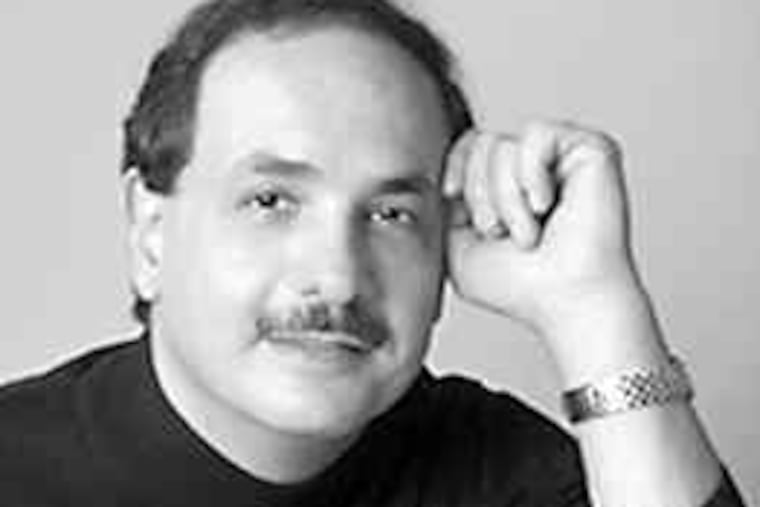Music: Curtis Symphony Orchestra to premiere Iranian composer's new concerto
Composer Behjad Ranjbaran's ravishing Violin Concerto, requiring enormous interpretive and virtuoso skills, is the centerpiece of Tuesday's program by the always exhilarating Curtis Symphony Orchestra.

Composer Behjad Ranjbaran's ravishing Violin Concerto, requiring enormous interpretive and virtuoso skills, is the centerpiece of Tuesday's program by the always exhilarating
Curtis Symphony Orchestra
.
It's also the first local performance of Ranjbaran's powerful symphonic music, which reflects his Iranian background.
"I wanted to contrast the modern violin to the ancient upright Iranian instrument, the kamancheh," Ranjbaran said of the concerto. "The instrument was mostly abandoned when the modern violin came in the 19th century, but it's now being played again. The lyrical and soft passages are reminiscent of this old upright fiddle, with the strong, virtuosic passages reflective of the modern violin."
As a young music student in Iran, Ranjbaran learned the classics but his country's folk music was banned, he recalled.
"I practiced Prokofiev, Mendelssohn, Stravinsky and Tchaikovsky very early," he said. On the weekends, though, the Tehran-born artist taught Persian music to children in remote villages like the one where his father had lived.
"When I was young, he said that genies and fairies came out after midnight. I remember looking toward the stars many nights to anticipate their arrival," he said. "Those impressions, which have been constant companions, are the inspiration for the concerto's second movement."
Ranjbaran was thrown into prison for reading banned, though legally published, poetry, and knew fellow prisoners whose political heroism sometimes resulted in torture and even execution.
"I was touched by those who selflessly gave of their lives for a better society, though I haven't yet seen the benefits of their sacrifices," he said. "In Iran, we've been engaged with modernization, a search for peace and a democracy with civility for almost 100 years." He is hopeful that the current, Internet-driven nonviolence movement among the country's youth will foster change.
"People all over the world have common concerns, the desire for their rituals and for freedom," he said. "I believe that the inner mission of music is a spiritual function in society, a common level of communication between human beings. Culture is like a river - we all contribute to the flow of its inner mission, and we all become enriched."
Ranjbaran met JoAnn Falletta in the mid-1980s at New York's Juilliard School, where he now teaches. His music first came to the ears of this writer through a CD of his explosive, dramatic and intensely beautiful "Persian Trilogy," led by Falletta with the London Symphony Orchestra. Its orchestral palette was fascinating, combining a tonal, accessible sonic imagination with grand dramatic gestures illustrating 11th-century epic poetry.
One of the busiest composers around, Ranjbaran wrote "Songs of Eternity" for Renee Fleming, and Yo-Yo Ma played his commissioned Elegy in Buffalo, N.Y. The Philadelphia Orchestra played his sizzling Violin Concerto in 2005 at the Saratoga Music Festival in New York. His tone poem "Saratoga" was performed there this past summer.
While studying violin and composition at Indiana University, Ranjbaran heard the then 12-year-old Joshua Bell play the challenging "Zigeunerweisen."
"That was my first encounter with a prodigy, playing the piece I was working on! I was shocked to see a youngster playing with such great ease and finesse. We became friends when we both moved to New York."
Bell premiered the Violin Concerto with the Royal Liverpool Philharmonic Orchestra in 2003.
Tuesday's performance also marks the Curtis debut appearance by Falletta, the Buffalo Philharmonic and Virginia Symphony maestro. To show off these youngsters' remarkable prowess, she has also programmed two other colorful orchestral showpieces - Strauss' "Don Juan" and Rimsky-Korsakov's "Sheherazade."
Tuesday's violin soloist will be the gifted Elissa Lee Koljonen, a 1994 Curtis graduate whose husband is Curtis President Roberto Diaz.
Koljonen said the concerto "lays in the hand very comfortably, without all kinds of funky fingerings, and it captured the ear of my 2-year-old Sofia, who thinks it's sparkly, and my son Nico [almost 3], who both listen to my practicing.
"It's very lyrical, virtuosic and everything a concerto should be. If I was asked which concerto I would most love to play, it would be this one."
Curtis Institute Symphony Orchestra, Verizon Hall, Kimmel Center for the Performing Arts, Broad and Spruce streets, 8 p.m. Tuesday, $5-$36, 215-893-1999, www.curtis.edu.
Send e-mail to dinardt@phillynews.com.